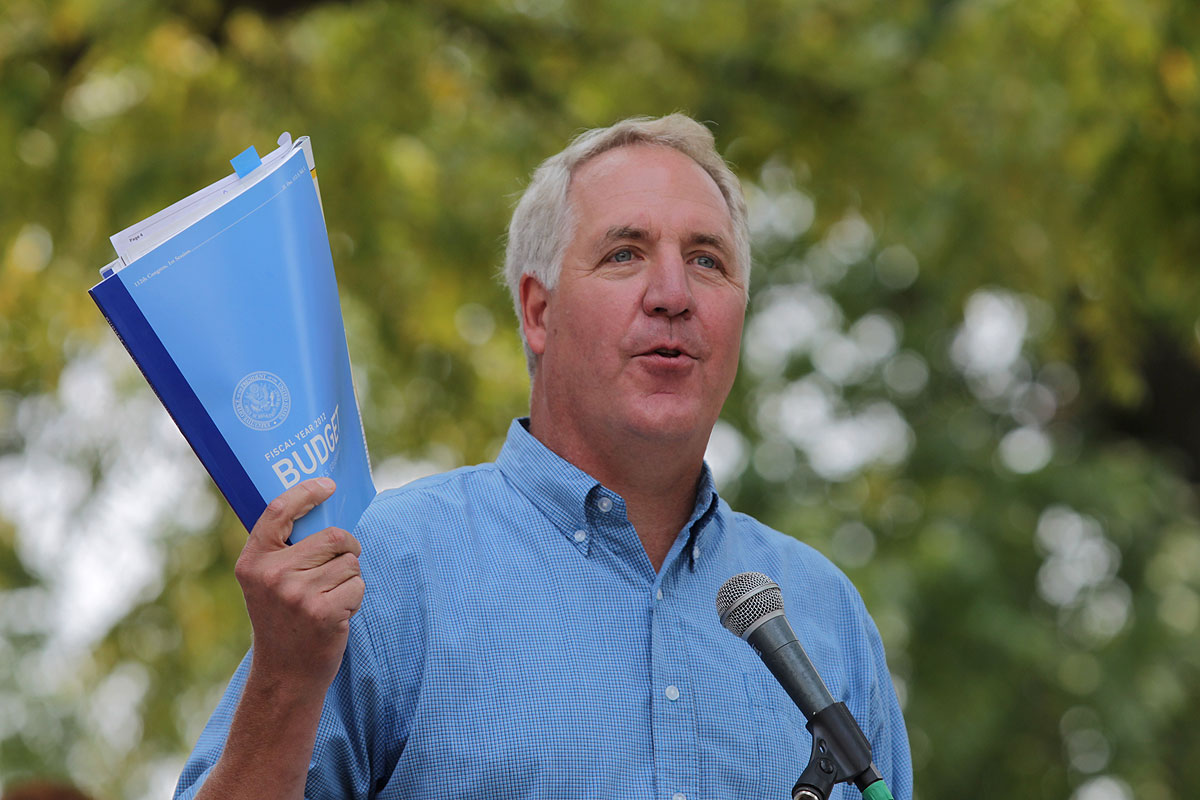A couple weeks ago, Illinois representative John Shimkus seemingly got himself in hot water by asking why men should have to pay for contraceptives and prenatal care, one of 10 "essential benefits" that insurance plans are required to carry under the Affordable Care Act:
He compared forcing men to have a policy that includes female contraceptive and prenatal coverage to paying for a prime piece of real estate that one could never actually visit.
“Why would you buy a cabin in Montana that you’re never going to use?” said Shimkus, whose expansive district covers much of Southern Illinois.
He got heat for it, but didn't back down. And it turned out he was prescient: Craig Gordon, the executive editor of Bloomberg News in Washington, just reported on Twitter that the White House's negotiations with the right-wing Freedom Caucus in the House would allow them to kill the essential benefits requirements altogether, even though that might not be enough to get critical votes from the Freedom Caucus.
But maybe prescient is the wrong word; Shimkus's view and the language he expressed it with are common within the GOP. Take the conservative Harvard economist Greg Mankiw, who was chair of the Council of Economic Advisors for a couple years during the George W. Bush administration and who advised Mitt Romney during his presidential run:
Everyone is now expected to buy insurance to pay for pregnancy and maternity care, even those who never intend to have children. The goal is to spread the risk of childbirth among the larger community.
But having children is more a choice than a random act of nature. People who drive a new Porsche pay more for car insurance than those who drive an old Chevy. We consider that fair because which car you drive is a choice. Why isn't having children viewed in the same way?
Then there's Renee Ellmers, a North Carolina Republican who raised the question when then-Health and Human Services secretary Kathleen Sebelius testified in front of a House committee on the ACA:
To the best of your knowledge, has a man ever given birth to a baby? As the hearing moved toward its end, Rep. Renee Ellmers, R-North Carolina, asked Secretary Sebelius that question, aiming to highlight that some men may be forced to buy maternity coverage as part of an insurance package under Obamacare. Sebelius responded that some men do need maternity coverage for their spouse and family, who could be covered under their policy. Ellmers insisted this is an example of why health care costs are going up, insurance coverage that may not be necessary for everyone.
And again with Lori Gottlieb, a psychotherapist and writer who wrote about her experiences under the ACA, in which her premiums went up $5,400 a year, for the New York Times: "it was in 2011 that I altered [my plan], dumping maternity benefits so that I didn’t have to pay for everyone else’s pregnancies. Little did I know I’d end up losing my insurance and paying for everyone else’s pregnancies."
So it's not a random idea that popped up into Shimkus's head; it's been a recognized issue since the ACA was developed. Current HHS secretary Tom Price's 2015 proposal for an ACA alternative would eliminate the essential benefits, in part, because their existence has kept younger people from taking plans on the individual market in the numbers that the ACA's designers expected.
Why does the requirement exist? It’s there to pool risks in the same way that employer-sponsored group plans do—the latter are required to have pregnancy coverage due to a 1978 law. Prior to the ACA, only 12 percent of individual-market plans had maternity-care coverage and riders cost thousands of dollars per year. A recent study from the actuarial firm Milliman found that the maternity-care requirement actually adds very little to the cost of insurance plans—about $8 to $14 a month. Without them, they estimate that insurance plans covering maternity care would cost 25 to 70 percent more. At Health Affairs, Timothy Jost estimates that removing the essential benefit requirement could even "make maternity care essentially an out-of-pocket expense, costing potentially $30,000 to $50,000."
All this is very much in the air right now. After announcing that they would pass the American Health Care Act yesterday, on the ACA's anniversary, the House GOP postponed the vote. They're being pulled in two directions: by the Freedom Caucus, for whom repealing essential benefits isn't enough, and moderate members in the House and Senate who fear that a health-care bill that would go back on the promises the president made on the campaign trail would leave them vulnerable at the ballot box. And, as I've written before, polling suggested that they have good reason to fear that—even before recent, disastrous polls on the AHCA.
John Shimkus was not alone or an outlier when he questioned the ACA's essential benefits requirement; proposed cuts to it have been building since the ACA's birth. But the shock over his comments was a sign of how dramatically the ground has shifted—now that the changes take away something that people already have, they've become far less popular.



